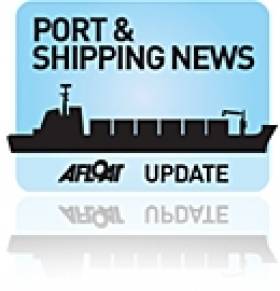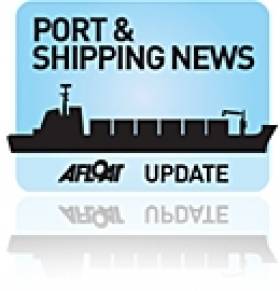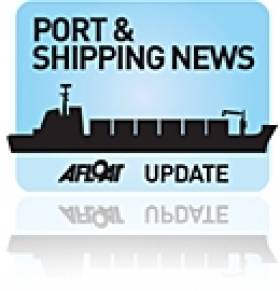Displaying items by tag: d'Amico Dry
D’Amico Group Launches Largest Newbuild
#dAmicoLargestShip – The d'Amico Group, the Italian international shipowner with offices in Dublin, has announced the delivery of the 'Handy-Cape' type vessel, Cielo d'Italia, the largest and most innovative ship in the history of the group.
At the Sanoyas Shipbuilding Corporation's shipyard in Mizushima, Japan, the d'Amico Group an international shipping operator for more than 60 years received the newbuild last week.
The value of the order for Cielo d'Italia and its handy cape sister which will be delivered in the first quarter of 2016 is approximately region 100 M$ (benefitting from the prevailing favourable weakening of the yen against the dollar) and is part of the most significant development plan in the history of d'Amico Group.
Cielo d'Italia will be employed by d'Amico Dry on a short period time charter until the delivery of its sister ship, expected in the first quarter of 2016. For the 2014-2016 period, the Group has invested approximately $1.2 billion by ordering 38 new ships, both bulkers and tanker vessels.
The new 117,000dwt ship, 245m long and 43m wide, is the result of multi-year collaboration between two prominent companies on the international shipping scene, who working very closely designed an extremely innovative ship characterized by extremely effective design particulars, respect for the environment and energy efficiency, capable of reducing consumption and emissions by 20%, compared to other ships operating in the same segment.
Since d'Amico established its operating companies in Ireland in 2002, the Group has expanded its activities in the Dublin office.
As previously reported on Afloat.ie, Minister for Transport Paschal Donohue welcomed d'Amico's continued commitment to investment in Ireland and interest in the development of the Irish maritime sector.
Currently its Tankers division is ranked in the 10 biggest Product Tanker controlling and managing companies in the world and this has firmly positioned its Dublin office as a significant international shipping operation.
D’Amico Dry’s ‘Dublin’s sister ‘San Francisco’ Docks in Cork’s Ringaskiddy Deepwater Terminal
#DublinsSister – Cielo di San Francisco a 37,000 dwt 'Handysize' dry-bulker docked in Cork's Ringaskiddy Deepwater Terminal from New Orleans, she is operated by Dublin based d'Amico Dry, writes Jehan Ashmore.
She along with a sister Cielo di Dublino, as previously reported in 2011, where acquired by d'Amico Dry, which is a subsidiary of the Italian d'Amico Group.
The christening ceremony of Cielo di San Francisco was performed by Mrs. Sandra Murphy, wife of Mr. Glenn Murphy, Director, Irish Maritime Development Office (IMDO).
The Liberian flagged vessels cost around US $60 million and were completed in South Korea at the Hyundai Mipo Dockyard (HMD) in Ulsan. The ships principle dimensions are 182m long, 27m beam and a 10.4m draught.
The entry by d'Amico Group into the dry-bulkers market had marked an important chapter since the subsidiary established an Irish office in 2002, as the vessels are managed from its Dublin office under the Irish Tonnage Tax (ITT) regime.
d'Amico Dry is engaged in chartering activities also in Monaco, Singapore, Vancouver and Stamford (US). Its core fleet is focused on Panamax, Supramax and Open Hatch/Box Shaped Handy size vessels, consists of a mixture of owned and long-term time chartered vessels.
Cielo di San Francisco is scheduled to depart Cork Harbour this evening and dock in Dublin Port tomorrow.
#NEWBUILD BULKER ORDER– Irish based d'Amico Dry with offices in Dublin, has ordered six 40,000 dwt bulk carrier newbuildings, with options for further six vessels, from China's Yangfan Group.
The company which is a fully owned subsidiary of the d'Amico group, has made the $134m deal, which values each handymax at $22.3m. The order for the new ships has been financed through bank lending.
Chief executive of d'Amico Cesare d'Amico said: "The new vessels will strengthen our position in the handysize market, which we feel has a great capacity for future growth, and also demonstrate our commitment to the environment by significantly reducing fuel consumption and exhaust emissions when compared with both existing vessels, and other newbuilding designs available.
He added "Given their characteristics, the vessels have also attracted strong interest from the financial world and, as a consequence, financing for the project has been offered by a number of European banks at very competitive pricing compared to today's market terms."
The newbuildings were designed by Deltamarin of Finland and optimised to meet d'Amico's requirements, including construction of box-shaped holds. Delivery for the new vessels is scheduled from mid-2014 from the Yangfan's Zhoushan shipyard. The Italian shipowning group also has the option from the shipyard to build the new vessels but to a fully open hatch design.
D'Amico Tankers Ltd, control either through ownership or charter arrangements a modern, high-tech and double-hulled fleet ranging from 35,000 to 52,000 deadweight tons. These product tankers operate in a sector that typically carry refined petroleum products, chemical and vegetable oils.
The company has a long tradition of family enterprise and operates worldwide with offices also in London, Monaco and Singapore.































































